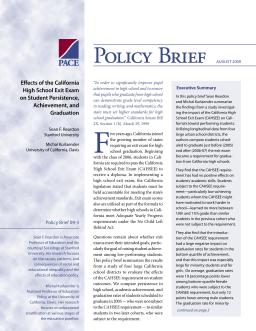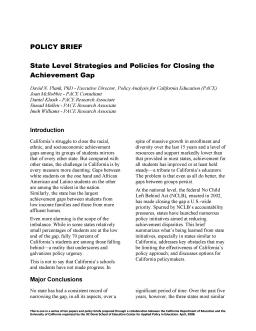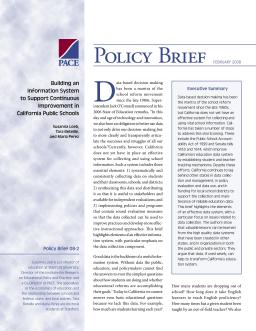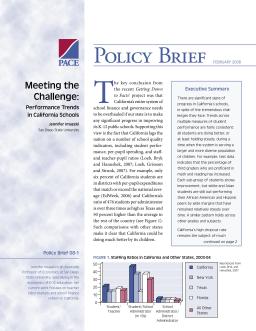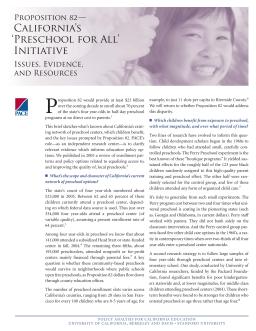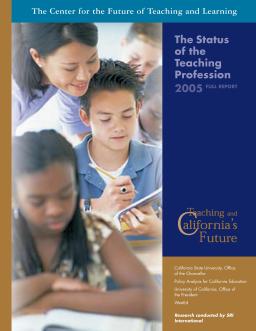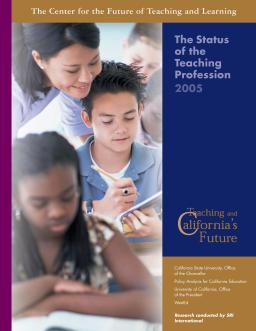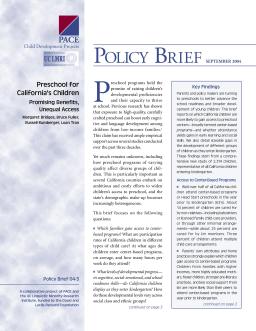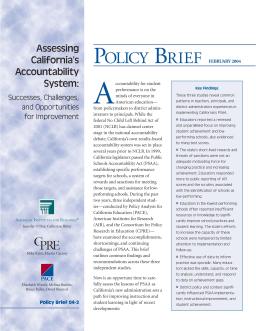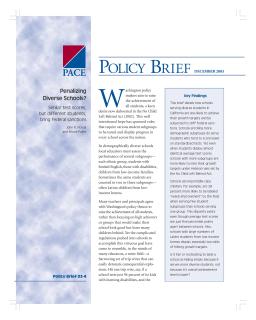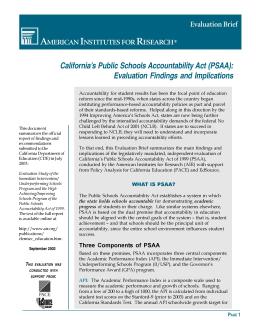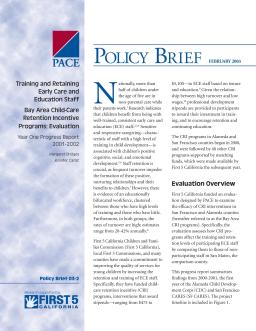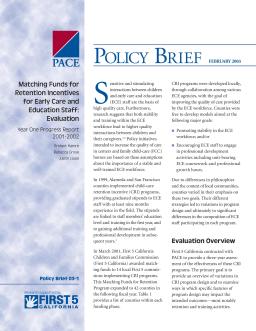Published
Summary
This brief examines the use of student test scores in teacher evaluations in CA. It argues that current evaluation methods are not effective, and that alternative methods of measuring teacher effectiveness, such as peer evaluations and student surveys, should be explored. The brief also discusses the potential consequences of over-reliance on test scores, such as teaching to the test and neglecting non-tested subjects. It concludes that teacher evaluations should be designed to provide useful feedback for professional development, rather than being used solely for accountability purposes.
Published
Summary
California faces significant challenges in closing the achievement gap between different student groups, including wide disparities based on race, ethnicity, and socioeconomic status. While progress has been made, the gaps persist. This report summarizes what is being learned from state initiatives to reduce these disparities, addresses obstacles limiting effectiveness, and provides options for policymakers to address this urgent issue.
Published
Summary
California needs to improve its education data system to collect and use vital school information for continuous improvement. The state is behind in data collection, management, evaluation, and funding compared to other states. The report suggests learning from other high-quality data systems and using data to transform California's education system.
Performance Trends in California Schools
Published
Summary
California's education system faces financial and demographic challenges, with per pupil spending below the national average and a majority of students living in poverty or English Learners. However, recent state and national assessments show improved academic performance, particularly for poor and minority students. More students are taking advanced math and science courses and meeting university admission requirements. While the state falls short of its goals, systemic reforms are needed, but the gains are a result of hard work and commitment from California's educators.
Data Systems and Policy Learning
Published
Summary
This report advocates for a continuous improvement approach to education in California, emphasizing the need for a comprehensive data system to inform decision-making and evaluation at all levels of the education system. It also recommends the use of research-based practices and the development of partnerships between schools and community organizations to support student success. The report emphasizes the importance of equity and suggests strategies for addressing achievement gaps and providing more resources to under-resourced schools.
Issues, Evidence, and Resources
Published
Summary
This brief provides an overview of California's existing network of preschool centers and the potential impact of Proposition 82, which would provide funding for half-day preschool programs for 70% of the state's four-year-olds. PACE, an independent research center, aims to clarify evidence informing education policy options. A 2005 PACE review focused on enrollment patterns and policy options for improving access and quality of local preschools.
Full Report
Published
Summary
The Teaching and California's Future initiative provides policymakers with data on the teacher workforce and labor market. The initiative's annual report details teacher development policies and their impact on teacher quality and distribution. The goal is to help policymakers make informed decisions about strengthening the state's teacher workforce.
Published
Summary
The quality of teaching and the need to expand California's ranks of excellent teachers demand urgent public discussion. We must attract the best and brightest to teaching, prepare them effectively, and support and retain them. Solutions require bipartisan leadership, not spin. This report presents the latest research and projections, highlighting that while some numbers are improving, we're likely to face severe shortages again soon and the pipeline for recruiting, preparing, and training teachers has substantial problems.
Promising Benefits, Unequal Access
Published
Summary
This policy brief examines how California's education governance has shifted from local control to centralized, administrative accountability over the past 30 years, including changes in school finance. It primarily focuses on categorical program funding, assessing its impact on equity, adequacy, flexibility, choice, efficiency, predictability, stability, rationality, and accountability. The authors also propose alternative models to the existing system of categorical funding.
Successes, Challenges, and Opportunities for Improvement
Published
Summary
California's accountability system, PSAA, has been examined by three independent studies, revealing five key issues. The system established specific performance targets, rewards, and sanctions for schools, but budget constraints and differences with NCLB require changes. The STAR testing and school assessment system needs review, and Governor Schwarzenegger proposed simplifying the school finance system. The brief aims to inform policymakers, clarify complex accountability issues, highlight educators' views, and outline four major implications.
Similar Test Scores, but Different Students, Bring Federal Sanctions
Published
Summary
California schools with more demographic subgroups are less likely to meet their growth targets and face federal sanctions, even when students have similar average test scores. Schools with many low-income Latino students are particularly unlikely to hit growth targets. Is it fair to label diverse schools as failing when their overall achievement level is not necessarily lower?
Evaluation Findings and Implications
Published
Summary
This report evaluates California's Public Schools Accountability Act of 1999, which aimed to hold schools accountable for student results. The brief summarizes the main findings and implications of the legislatively mandated, independent evaluation of the Act, with the aim of helping states understand and learn from preceding accountability efforts.
Bay Area Childcare Retention Incentive Programs Evaluation—Year One Progress Report, 2001–02
Published
Summary
The First 5 California Children and Families Commission has funded the Childcare Retention Incentive (CRI) to improve the quality of early care and education (ECE) staff training and retention. An evaluation funded by First 5 California assesses the efficacy of CRI programs in San Francisco and Alameda counties. This report summarizes the preliminary findings from the first year of the Alameda Child Development Corps and San Francisco CARES programs, which examine whether CRI recipients are more likely to participate in training and be retained compared to non-participating ECE staff.
Year One Progress Report, 2001–2002
Published
Summary
This policy brief examines the effectiveness of childcare retention incentive (CRI) programs in selected California counties. It assesses program design, participant characteristics, training activities, and retention rates among early care and education staff. The study aims to identify the impact of CRI programs on the stability and training of the ECE workforce, which is critical for improving the quality of care for children.
